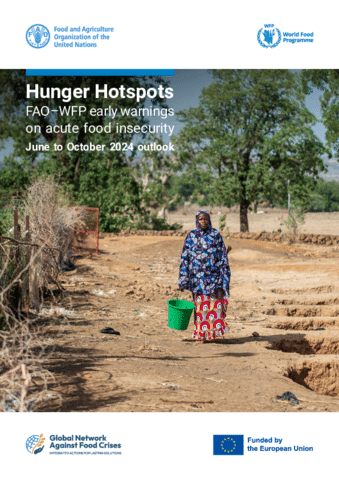Issued yesterday, the report ‘Hunger Hotspots – FAO-WFP early warnings on acute food insecurity’ calls for urgent humanitarian action to save lives and prevent starvation in 18 hotspots across the globe. In these places, acute hunger is at risk of worsening from June to October 2024.
The report spotlights the urgent need for assistance to prevent famine in Gaza and Sudan and further deterioration in the devastating hunger crises affecting Haiti, Mali, and South Sudan. It also warns of the lingering impact of El Niño and the looming threat of La Niña that risks bringing further climate extremes.
Gaza exposed to the worst level of famine by mid-July
The ongoing conflict in Palestine is expected to further aggravate already catastrophic levels of acute hunger, with starvation and death already taking place, alongside the unprecedented death toll, widespread destruction and displacement of nearly the total population of the Gaza Strip – the report warns.
In mid-March 2024, famine was projected to occur by the end of May in the two northern governorates of the Gaza Strip unless hostilities ended, full access was granted to humanitarian agencies, and essential services were restored.
Over one million people – half the population of Gaza – are expected to face death and starvation (IPC Phase 5) by mid-July. The report also warns of broader regional ramifications of the crisis, which risk exacerbating the already high food security needs in Lebanon and the Syrian Arab Republic.
The Sudan hit by conflict and displacement
In Sudan, 18 million people are acutely food insecure, including 3.6 million malnourished children. Famine is rapidly closing in on millions of people in Darfur, Kordofan, Al Jazirah and Khartoum, as recently stated by the Principals of the Inter-Agency Standing Committee.
The crisis – now in its second year – is home to the largest number of internally displaced people in the world at nearly 10 million. A further two million people have fled across borders, deepening the burden on neighbouring countries hosting a steadily growing number of refugees and returnees – especially in South Sudan and Chad, where existing hunger crises are deepening due to the spillover from the deadly conflict in Sudan.
Mali, South Sudan and Haiti among other hotspots

Chad, the Democratic Republic of Congo (DRC), Myanmar, the Syrian Arab Republic and Yemen are hotspots of very high concern, with many people facing critical levels of food insecurity.
Since the previous edition of the Hunger Hotspots report (October 2023), the Central African Republic, Lebanon, Mozambique, Myanmar, Nigeria, Sierra Leone and Zambia have joined Burkina Faso, Ethiopia, Malawi, Somalia and Zimbabwe in the list of hunger hotspots, where acute food insecurity is likely to deteriorate further during this outlook period.
Prevention is key, rather than an emergency response
“The daunting prospects highlighted in this report should serve as a wake-up call to all of us”, FAO Director-General QU Dongyu said. “Acting ahead of crises can save lives, reduce food shortages and protect livelihoods at a much lower cost than a not timely humanitarian response”.
“Once a famine is declared, it is too late – many people will have already starved to death”, said Cindy McCain, WFP Executive Director.
This edition of the report warns that La Niña conditions are expected to prevail between August 2024 and February 2025, significantly influencing rainfall distribution and temperatures.
The shift in climate could have significant implications for several hotspots, including the risk of floods in parts of South Sudan, Somalia, Ethiopia, Haiti, Chad, Mali and Nigeria, as well as Sudan.
Meanwhile, the Caribbean is bracing for an extremely active Atlantic hurricane season. The report warns that continuous monitoring will be vital due to the uncertainty of current forecasts.

